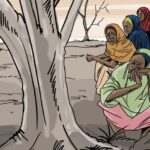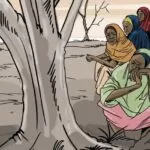
Despite global efforts to improve social protection since 2015, more than two billion women and girls are still left unprotected—trapped in a cycle of poverty without access to essential support like pensions, healthcare, and unemployment benefits, the United Nations Women (UN Women) revealed in its flagship report ahead of the International Day for the Eradication of Poverty, slated for 17 October 2024.
The report, which underscores the role of women in development around the world, revealed that women and girls are more vulnerable to poverty as widening gaps in means of social protection were identified.
“Out of nearly 1,000 social protection measures adopted by governments across 171 countries in the months that followed, only 18 per cent targeted women’s economic security,” a part of the statement stated. Maternity care remains a critical concern, with more than “63 per cent of women worldwide still giving birth without access to maternity benefits, with the figure soaring to 94 per cent in sub-Saharan Africa.”
With no financial assistance during maternity leave, UN Women assert that this economic disadvantage does not only compromise the health of the women involved but also risks the well-being of their children while fostering generational poverty.
The stark gender disparity extends to younger women, with those aged 25 to 34 being 25 per cent more likely than their male counterparts to live in extreme poverty. Climate change and conflict have been identified as major drivers of this inequality, with “women in fragile contexts are said to be 7.7 times more likely to live in extreme poverty compared to those in non-fragile environments.”
While presenting the report at a joint event with the United Nations Department of Economic and Social Affairs, Sarah Hendriks, Director of the Policy, Programme, and Intergovernmental Division at UN Women, stressed the urgency of addressing these gaps: “To harness this, we need to centre the dignity, agency, and empowerment of women and girls at every stage of the process, from policy and program design to delivery and financing.”
The report highlights successful initiatives that offer hope for narrowing the gender gap. Mongolia, for instance, has extended maternity leave benefits to informal workers, herders, and self-employed women while strengthening paternity leave to support gender equality in caregiving responsibilities. In Mexico and Tunisia, domestic workers are being integrated into social security systems, and in Senegal, the National Health Insurance has adapted its services to reach rural women.
These initiatives, which the UN Women described as transformative, show the potential of gender-responsive systems, policies, and programs that address women and girls’ distinct challenges.
The UN Women report reveals that over two billion women and girls remain without social protection, exposed to poverty without pensions, healthcare, or unemployment benefits. Despite global measures since 2015, only 18% targeted women’s economic security, highlighting significant gaps. Critical issues include maternity care, with 63% of women lacking maternity benefits, and young women aged 25-34 are 25% more likely to experience extreme poverty than men, exacerbated by climate change and conflict.
The report underscores the need to prioritize women’s dignity, agency, and empowerment in policies, programs, and funding. It highlights successful initiatives in Mongolia, Mexico, Tunisia, and Senegal, which address gender disparities in social security and care responsibilities, demonstrating the transformative potential of gender-responsive systems.
